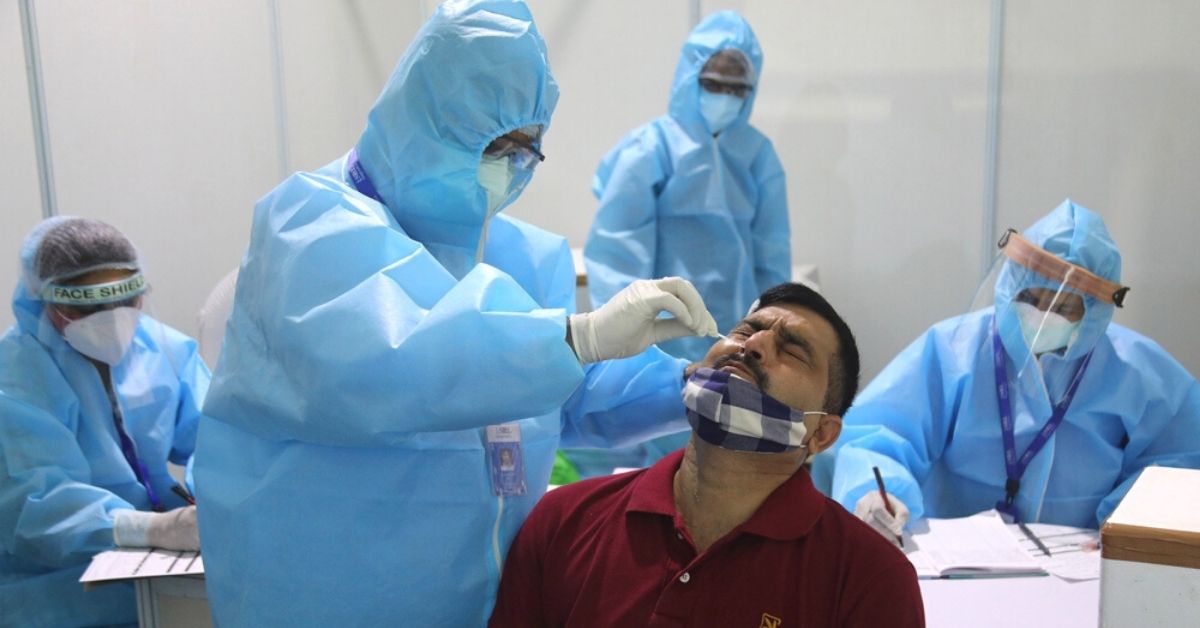Green Fungus Detected in Person Recovered From COVID-19: All You Need To Know
Aspergillosis or Green Fungus affects the lungs and oral cavities. Pulmonologist Dr Ravi Shekhar Jha from Fortis hospital, Faridabad, answers questions about its treatment and symptoms.

This article is a part of a series by The Better India to share verified information about COVID-19 care. While several posts on various aspects of fighting COVID-19 are being circulated on social media and messaging services like WhatsApp, we urge you not to trust unverified content. To separate fact from fiction, we will be sharing the videos and content with doctors and experts and bring you their responses with scientific research-backed information
A 34-year-old from Madhya Pradesh spent close to two-months battling COVID-19. However, even after recovering, the ordeal did not end for him. Soon after recovery he was diagnosed with a fungal infection called Aspergillosis, also being referred to as ‘Green Fungus.’
On 15 June 2021, he was airlifted from Indore to Mumbai by an air ambulance for treatment. This patient was found to have infection in his sinuses, lungs and blood. This is the first reported case in India where a patient has contracted this fungal infection post recovering from COVID-19. Subsequently, a patient from Punjab’s Jalandhar also has come forward with symptoms of Aspergillosis.
Dr Ravi Shekhar Jha, Head of Department and Senior Consultant – Pulmonology, Fortis Escorts Hospital, Faridabad, talks about treating Green Fungus.
What is Aspergillosis/Green Fungus?
Dr Jha: Aspergillosis is a fungal infection that most commonly affects the lungs. This is not a new fungal infection and has been prevalent for long. People with a weakened immune system or those who already are suffering from a lung disease or pneumonia are at risk of contracting this infection. Since COVID-19 affects the lungs, there is a chance of those recovering or currently dealing with COVID-19 to contract the fungal infection.
According to the Centers for Disease Control and Prevention (CDC), Aspergillosis is an infection caused by Aspergillus, a common mold (a type of fungus) that lives indoors and outdoors. Most people breathe in Aspergillus spores every day without getting sick.
Is Green Fungus or Aspergillosis similar to the earlier detected fungal infections?
Dr Jha: No, this is a different kind of fungal infection and has no correlation to the other infections. While the scientific name for this fungal infection is Aspergillosis, Green Fungus is merely a name that has been attributed to it. This biological fungus has been in existence for very long and we often see patients presenting symptoms for the same. It is imperative that we start referring to these fungal infections with their correct scientific name to avoid chaos.
When the fungus is being examined during culture in the laboratory, it may show various colours and hence the reference to it as Green Fungus.
Would it be fair to say that this fungal infection is connected to COVID-19?
Dr Jha: It is not primarily related to COVID-19. It is normally found in the oral cavity and sometimes in the lungs. In COVID-19 patients, since the immunity is compromised and steroids are used in the treatment, it can invade your blood vessels and other tissues.
So, while this fungal infection can happen to someone who has recovered from COVID-19, it is not exclusive to COVID-19 alone.
What symptoms are associated with this fungal infection?

Dr Jha: The symptoms are similar to pneumonia. Fever, cough, breathing difficulty, invasion of blood vessels that leads to low blood pressure and, in some cases, bleeding from the mouth, which is referred to as Hemoptysis.
It is important to note that Aspergillosis/Green Fungus is not contagious and cannot be transmitted from one being to another or from animals to people.
According to CDC, the symptoms vary depending on the type of Aspergillosis one has contracted. The different symptoms associated with other Aspergillosis diseases are as follows:
Allergic bronchopulmonary Aspergillosis (ABPA):
- Wheezing
- Shortness of breath
- Cough
- Fever (in rare cases)
Allergic Aspergillus sinusitis:
- wheezing
- Stuffiness
- Runny nose
- Headache
- Reduced ability to smell
Aspergilloma (fungus ball):
- Cough
- Coughing up blood
- Shortness of breath
Chronic pulmonary Aspergillosis:
- Weight loss
- Cough
- Coughing up blood
- Fatigue
- Shortness of breath
Invasive Aspergillosis:
- Fever
- Chest pain
- Cough
- Coughing up blood
- Shortness of breath
- Other symptoms can develop if the infection spreads from the lungs to other parts of the body.
What are the treatment options?
Dr Jha: There are antifungal agents that are used for the treatment of these diseases. In the case of Mucormycosis/Black Fungus, the treatment options are very few but in the case of Aspergillosis, medicines are available for both oral consumption and intravenous (IV) administration.
It is important to note that Aspergillosis is treatable. In my years of practice I have successfully treated many patients with Aspergillosis.
What precautions should one follow to stay safe?
Dr Jha: To begin with, the use of steroids in the treatment of COVID-19 must be justified. One should refrain from using steroids as an OTC (Over The Counter) drug and they should not be consumed unless it has been prescribed by a treating physician.
According to the CDC, one should try to avoid areas with a lot of dust like construction or excavation sites. If you can’t avoid these areas, wear an N95 respirator–a type of face mask–while you’re there.
- Avoid activities that involve close contact to soil or dust, such as yard work or gardening.
- Wear shoes, long pants, and a long-sleeved shirt when doing outdoor activities such as gardening, yard work, or visiting wooded areas.
- Wear gloves when handling materials such as soil, moss, or manure.
- To reduce the chances of developing a skin infection, clean skin injuries well with soap and water, especially if they have been exposed to soil or dust.
Continue to wear a double mask, maintain physical distancing and wash your hands or sanitise at regular intervals.
(Edited by Yoshita Rao)
This story made me
-
97
-
121
-
89
-
167
Tell Us More
If you found our story insightful, informative, or even just enjoyable, we invite you to consider making a voluntary payment to support the work we do at The Better India. Your contribution helps us continue producing quality content that educates, inspires, and drives positive change.
Choose one of the payment options below for your contribution-
By paying for the stories you value, you directly contribute to sustaining our efforts focused on making a difference in the world. Together, let's ensure that impactful stories continue to be told and shared, enriching lives and communities alike.
Thank you for your support. Here are some frequently asked questions you might find helpful to know why you are contributing?



















